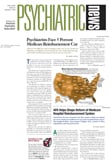Missouri state officials have launched an effort to improve the quality of prescribing of psychotropic medications for Medicaid patients while simultaneously generating cost savings.
The Mental Health Medicaid Pharmacy Partnership Project came about when Comprehensive NeuroScience Inc. (CNS), a for-profit company specializing in products and services related to neuropsychopharmacy, approached state officials with an offer to work with them to determine whether targeted educational materials could promote the use of “best practices” in prescribing for the Medicaid population with mental illness. Eli Lilly and Co. provides financial support to CNS for the project.
A similar effort by the Massachusetts Division of Medical Assistance yielded savings, primarily by reducing the number of patients who were taking five or more psychotropic medications at one time (Psychiatric News, May 16).
Joseph Parks, M.D., medical director of the Missouri Department of Mental Health (DMH), spoke about the project at the conference “Behavioral Healthcare Tomorrow: Alternative Solutions to Restrictive Access to Care Policies,” in Baltimore on October 19 and expanded on his comments in an interview with Psychiatric News.
“Discussions about the impact of the rising costs of prescription drugs on state budgets have been largely adversarial up to now,” he said. “Everyone involved has to start accepting ownership for the problem. Physicians need to be concerned about cost, as well as quality of care. Pharmaceutical companies should make efforts to educate about inappropriate prescribing, as well as the merits of new drugs, and Medicaid officials must pay attention to clinical issues, as well as to fiscal constraints.”
The project takes a noncoercive approach to changing behavior and emphasizes inclusive decision making, Parks said.
CNS convened a panel of psychiatrists and pharmacologists who reviewed existing prescribing guidelines and relevant literature to develop a list of “clinical quality indicators” or practices that indicate a potential prescribing problem. In addition to problems associated with polypharmacy, the list targets items such as “no refill for continuous antipsychotics within 30 days of prescription ending.”
They also reached consensus on a target list of 120 psychotropic medications that are commonly used to treat mental illness.
An advisory committee, which included representatives of the three psychiatric societies in the state and departments of psychiatry at major universities, reviewed the lists of indicators and medications.
Staff then developed a continuum of indicators, in terms of the expected controversy they might generate, and implemented the least controversial first. In the first cycle, for example, they targeted the “no refill” item, the prescription of three or more atypical antipsychotics for one patient by a single prescriber, and the prescription of antipsychotic medications for one patient by more than one prescriber.
In the second cycle, they added the prescription of three or more of any psychotropic drug to a person under age 18 and the prescription of two or more drugs from the same therapeutic class.
Other indicators were added in the third cycle, and still others remain to be added. The list of indicators is considerably more extensive than that developed in Massachusetts.
Staff examined Medicaid pharmacy claims records to identify physicians whose prescribing was possibly “questionable,” as defined by the list of clinical quality indicators, and sent letters explaining the problems with the prescribing practice.
In a future stage of the project, physicians who persist with prescribing that deviates from the guidelines will receive phone calls from Missouri physicians who have been trained to offer guidance in a peer-review process.
In a meeting in August, after which seven clinical quality indicators had been activated in terms of letters to physicians, Parks reported that 37.3 percent, or $25,954,981, of the total of $69,724,352 spent on psychotropic drugs during April to June of that year was flagged as deviating in terms of the indicators.
The prescribing affected 26.4 percent of the patients receiving psychotropic medications through Medicaid during that time period.
The project was also successful in identifying 2,938 children and adults who had not refilled prescriptions within 30 days, even though continuation was medically indicated. Their doctors were notified so they could follow up with the patients.
Parks said, “With educational efforts we can expect only to slow the rate of increase in the cost of prescription drugs to Medicaid. But, that change is significant if it helps us avoid more Draconian cuts in prescription drugs or in other components of the Medicaid budget.”
Cost data are preliminary because aspects of the project have not been implemented and because of the lag time in realizing savings. However, said Parks, reports show that the project has had a positive financial impact. The increase in spending on Medicaid psychotropic drugs for the fiscal quarter ending in June was 2.4 percent over that of the previous quarter.
By contrast, for the “outlier” spending identified by the project, the increase was only .8 percent during the same period. The claims’ volume went down 1.7 percent for the outlier spending and increased by .3 percent for total Medicaid spending on psychotropic prescription drugs.
Parks said, “In addition to the cost savings, we have seen improvements in quality in prescribing. We believe the project shows the value of engaging physicians in dialogue.” ▪
